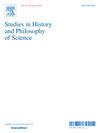Risk, Islam, and counter-experts: Analyzing the fatwa against the Muria nuclear power plant
IF 1.8
2区 哲学
Q1 HISTORY & PHILOSOPHY OF SCIENCE
引用次数: 0
Abstract
This article examines how the ulama (Islamic scholars) construct and categorize risk in relation to an Islamic fatwa that forbids the construction of a nuclear power plant in Muria, Indonesia. The primary objective of this article is not to ascertain the veracity of risk but rather to comprehensively analyze the multitude of assertions made by the ulama regarding risk within the fatwa. This article presents findings that indicate the risk associated with the Muria nuclear power plant is primarily shaped and being constructed by democratic principles of accountability and transparency, as analyzed through Science and Technology Studies (STS) concepts such as risk, expertise, and counter-experts. The possible contribution of Islamic values—maslaha (benefits) and mafsadah (harms)—in advancing technological advancements with ethical considerations to benefit the public at large is discussed in this article. It also promotes public participation in science and technology, emphasizing the importance of discussing decisions about nuclear power plants with the impacted communities.
风险、伊斯兰教和反专家:分析针对穆里亚核电站的法特瓦
这篇文章检视伊斯兰学者如何建构和分类与禁止在印尼穆里亚建造核电厂的伊斯兰教令相关的风险。本文的主要目的不是确定风险的真实性,而是全面分析乌拉玛关于法特瓦内风险的众多断言。本文提出的研究结果表明,与穆里亚核电站相关的风险主要是由问责制和透明度的民主原则形成和构建的,通过科学和技术研究(STS)概念(如风险、专业知识和反专家)进行分析。本文讨论了伊斯兰价值观——maslaha(利益)和mafsadah(危害)——在推动技术进步的同时兼顾伦理考虑,以造福广大公众方面可能做出的贡献。它还促进公众对科学技术的参与,强调与受影响的社区讨论核电站决策的重要性。
本文章由计算机程序翻译,如有差异,请以英文原文为准。
求助全文
约1分钟内获得全文
求助全文
来源期刊

Studies in History and Philosophy of Science
管理科学-科学史与科学哲学
CiteScore
2.50
自引率
10.00%
发文量
166
审稿时长
6.6 weeks
期刊介绍:
Studies in History and Philosophy of Science is devoted to the integrated study of the history, philosophy and sociology of the sciences. The editors encourage contributions both in the long-established areas of the history of the sciences and the philosophy of the sciences and in the topical areas of historiography of the sciences, the sciences in relation to gender, culture and society and the sciences in relation to arts. The Journal is international in scope and content and publishes papers from a wide range of countries and cultural traditions.
 求助内容:
求助内容: 应助结果提醒方式:
应助结果提醒方式:


